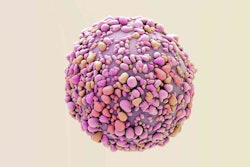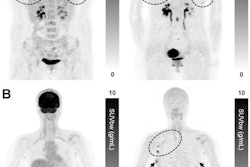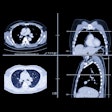CHICAGO – Gallium-68 (Ga-68) fibroblast activation protein inhibitor (FAPI) PET/CT shows promise for detecting primary and metastatic breast cancer, according to a December 1 presentation at RSNA.
Madina Gabdullina, PhD, of Asfendiyarov Kazakh National Medical University in Almaty, Kazakhstan, presented a prospective study that compared Ga-68 FAPI-PET/CT to F-18 FDG-PET/CT for identifying disease in 17 women.
“Ga-68 FAPI-PET/CT markedly enhances the detection and staging of primary and metastatic breast cancer, demonstrating superior sensitivity and specificity compared to F-18 FDG-PET/CT,” Gabdullina said.
While F-18 FDG-PET/CT has been shown to be more effective than conventional imaging methods for diagnosing various cancers based on tumor glucose metabolism, the approach is still limited by a low sensitivity for detecting small tumors, Gabdullina explained. Conversely, FAPI radiotracers bind to fibroblast cells in tumor stroma, the non-cancerous extracellular matrix that supports tumors, and are thought to be more specific.
To build evidence for the effectiveness of FAPI-PET/CT, the researchers enrolled 17 women diagnosed with breast cancer from January 2024 to April 2024. The mean age of participants was 52.5 years. Each participant underwent both Ga-68 FAPI-PET/CT and F-18 FDG-PET/CT. The lesions identified were subsequently confirmed histologically.
The group identified 20 primary lesions and 43 metastatic lymph nodes in the patients, as well as 10 bone metastases and six liver metastases. Ga-68 FAPI-PET/CT showed a sensitivity of 100% and a specificity of 86% for primary tumors. Comparatively, F-18 FDG-PET/CT demonstrated a sensitivity of 83% and specificity of 71%. Significantly, Ga-68 FAPI-PET/CT identified three primary lesions smaller than 7 mm in size, Gabdullina noted.
For detecting lymph node metastases, Ga-68 FAPI PET/CT had a diagnostic accuracy of 100% compared with 76.74% for F-18 FDG-PET/CT and for detecting distant metastases, Ga-68 FAPI-PET/CT achieved an accuracy of 100% compared with 87.5% for F-18 FDG.
Finally, a receiver operating characteristic (ROC) analysis revealed a significantly higher area under the curve (AUC) of 0.945 for Ga-68 FAPI- PET/CT compared with 0.783 for F-18 FDG-PET/CT, indicating superior diagnostic performance (p < 0.001).
Limitations of the study included the small sample size and the single center analysis, as well as that not all metastases were biopsied, Gabdullina said. She also noted, however, that Ga-68 FAPI-PET/CT scans resulted in upstaging of patients, with the stage of disease key for determining the best treatment plans.
“Crucially, it also resulted in upstaging in 23.7% of cases, indicating its potential to more accurately assess the extent of disease, thereby influencing treatment strategies and potentially improving patient outcomes,” Gabdullina concluded.
For full 2024 RSNA coverage, visit our RADCast.



















